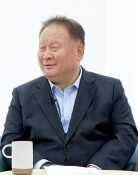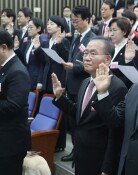The Humiliation of Populism
The U.S. and Japanese governments announced Saturday that they will relocate the U.S. Marine Corps Air Station Futenma near Naha, the capital of Okinawa Prefecture, to the coastal area of Camp Schwab in Nago as scheduled. Ahead of the upper house election in August last year, the campaign pledges of the then main opposition Democratic Party of Japan did not include a promise on relocating the airbase outside the prefecture. In his campaign speeches, however, eventual Prime Minister Yukio Hatoyama pledged to relocate the base outside Okinawa. He has since broken this pledge and accordingly completely lost face in the prefecture.
The aviation unit of the U.S. Marines uses helicopters and vertical take-off and landing aircraft. Its airbase is smaller than those used by the U.S. Air Force. Hence, if the size of the city that houses its airbase increases, the airbase is eventually surrounded by diverse buildings. A case in point is Futenma. In 2006, Washington and Tokyo agreed to relocate the airbase to Camp Schwab in the sparsely populated Nago. Okinawa residents, however, who have deep a sense of loss toward Tokyo, demanded that their central government relocate the airbase out of Okinawa.
Hatoyama pledged to listen to their demand. As a result, a Democratic Party candidate won an election in Okinawa and Hatoyama became prime minister. Though he sought to keep his promise, he found no other candidate site for the airbase. His blank pledge only deteriorated relations between Washington and Tokyo. Japanese media called the Hatoyama administration a Japanese version of the Roh Moo-hyun administration of Korea, described conflict between Seoul and Washington under Roh, and carried news analyses of the dispute between Washington and Tokyo. Hatoyama visited the Okinawa governor Sunday and apologetically said, Tokyo had no other choice but to relocate the airbase to the coastal area in Camp Schwab as scheduled.
North Korean spy Shin Kwang-su in the late 1980s kidnapped five Japanese nationals, including Megumi Yokota. Shin was arrested in 1985 after entering South Korea. Four years later, Keiko Chiba of the Socialist Party of Japan released a statement urging Seoul to release him. In 1997, she joined the Democratic Party and was named justice minister under the Hatoyama government last year. Chiba offered an apology over her request for Shins release, saying, I was unaware of the situation. I feel deeply sorry. She thus reflected on her erroneous populist behavior. Hatoyama appears to be of a similar mind. In Korea, populist campaign pledges are rampant ahead of the June 2 local elections. Voters must sort the good politicians from the bad.
Editorial Writer Lee Jeong-hoon (hoon@donga.com)







